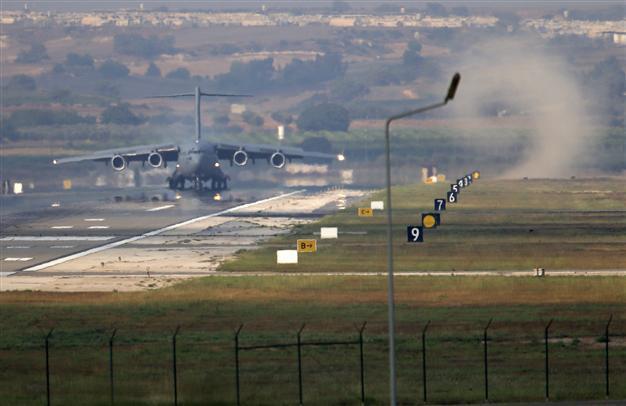US to defend Syrian rebels with airpower, including from Assad
WASHINGTON - Reuters

A United States Air Force cargo plane maneuvers on the runway after it landed at the Incirlik Air Base, on the outskirts of the city of Adana, southern Turkey, Friday, July 31, 2015. AP Photo
The United States has decided to allow airstrikes to defend Syrian rebels trained by the U.S. military from any attackers, even if the enemies hail from forces loyal to Syrian President Bashar al-Assad, U.S. officials said on August 2.The decision by President Barack Obama, which could deepen the U.S. role in Syria's conflict, aims to shield a still-fledging group of Syrian fighters armed and trained by the United States to battle Islamic State of Iraq and the Levant (ISIL) militants -- not forces loyal to Assad.
But in Syria's messy civil war, Islamic State is only one of the threats to the U.S. recruits. The first batch of U.S.-trained forces deployed to northern Syria came under fire on July 31 from other militants, triggering the first known U.S. airstrikes to support them.
U.S. officials, speaking on condition of anonymity to confirm details of the decision, first reported by the Wall Street Journal, said the United States would provide offensive strikes to support advances against ISIL targets.
The United States would also provide defensive support to repel any attackers.
U.S. officials have long played down the idea that Assad's forces - which have not fired on U.S.-led coalition aircraft bombing ISIL targets in Syria - would turn their sights on the U.S.-backed Syrian rebels. But they cannot rule out the possibility, perhaps in an unintentional clash.
The Pentagon and the White House declined to discuss the decision on rules of engagement or confirm comments by the unnamed U.S. officials.
White House National Security Council spokesman Alistair Baskey said only the U.S.-trained forces were being provided a wide range of support, including "defensive fires support to protect them" and pointed to July 31 U.S. airstrikes as proof.
"We won't get into the specifics of our rules of engagement, but have said all along that we would take the steps necessary to ensure that these forces could successfully carry out their mission," Baskey said.
Pentagon spokeswoman Commander Elissa Smith also declined comment on the rules of engagement, saying only that the U.S. military's program focuses "first and foremost" on combating ISIL militants.
"We recognize, though, that many of these groups now fight on multiple fronts, including against the Assad regime, (ISIL) and other terrorists," Smith said.
In the meantime, Russia on August 3 criticised U.S. plans to provide together with Turkey air cover for Syrian rebels, saying any support for rivals of Russian ally Syrian President Bashar al-Assad hampered Damascus' fight against ISIL.
"Moscow has stressed multiple times that helping Syrian opposition, let alone helping with financial or (military) technical means, would lead to a further destabilisation of the situation in the country," Kremlin spokesman Dmitry Peskov told reporters.
The U.S. military launched its program in May to train up to 5,400 fighters a year in what was seen as a test of Obama's strategy of getting local partners to combat extremists and keep U.S. troops off the front lines.
The training program has been challenged from the start, with many candidates being declared ineligible and some even dropping out.
Obama's requirement that they target militants from ISIL has sidelined huge segments of the Syrian opposition focused instead on battling Syrian government forces. The United States has sought to avoid a direct confrontation with Assad.
Once the Syrian rebels have returned to the battlefield, the U.S. recruits and other fighters aligned with them have turned into targets of rival militants.
Al Qaeda's Syria wing is suspected of being behind the attack on July 31 against them at a compound in Syria, which was also being used by members of a Western-aligned insurgent group, known as Division 30.
U.S. recruits have hailed from Division 30. Nusra Front last week claimed to have abducted Division 30's leader but U.S. officials, speaking on condition of anonymity, said he had not undergone U.S. training
One of the most powerful insurgent groups in northern Syria, Nusra Front has a record of crushing rebel groups that have received support from Western states, including the Hazzm movement that collapsed earlier this year.
















